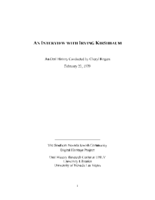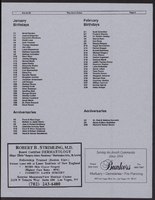Search the Special Collections and Archives Portal
Search Results

Transcript of interview with Irving Kirshbaum by Cheryl Rogers, February 23, 1979
Date
Archival Collection
Description
Interview with Irving Kirshbaum by Cheryl Rogers on February 23, 1979. In this interview, Kirshbaum discusses the Riviera Hotel where he began working in 1955. He also talks about the landscape of the Las Vegas Strip in the 1950s, and the state of gambling, comps, customer service, and dealer training. The interviewer asks about the treatment of minorities at the Riviera, and in Las Vegas generally, and the effect of corporate ownership on casinos.
Text

Transcript of interview with Mary Shaw by Barbara Tabach, September 2, 2011
Date
Archival Collection
Description
For the first 19 years of her life, Mary Martell Shaw called Central America home. Then thanks to misrouted luggage, she met the love of her life Rollin H. Shaw, a civil engineer, at a time in when his atomic energy career was taking off. In October 1943, they married in Costa Rica and for the next two decades traversed the country: Hawaii to California to Panama—wherever a project required Ronnie's engineering skills. Mary supported her husband every step of the way, with every new location. As a traditional homemaker of the era, she became adept at raising their four kids while packing boxes, enrolling them in school and setting up a warm home wherever they landed. The move to Las Vegas in September 1964, however, left her a bit challenged: there was a shortage of adequate housing, a concern for where to send her two daughters and two sons to school, and the feeling that they wouldn't be here long. Years later, Mary and Ronnie would retire to the city where their roots ran deepest, Las Vegas. With great wit, Mary recalls the long absences demanded by Ronnie's work with the Atomic Energy Commission. She also tells stories of the great fun they and their fellow Nevada Test Site employees had at parties, of her learning to paint with watercolors, and the pride she has of all her children's successes based on their education in Las Vegas.
Text

Richard C. MacDonald interview, September 20, 2016: transcript
Date
Archival Collection
Description
Henderson developer and Philadelphia native Richard MacDonald is a natural storyteller, and he has stories to tell. The man behind MacDonald Highlands and the Dragon Ridge Country Club first moved to Las Vegas as a young teen with his parents in 1959. After graduating Las Vegas High School in 1963, his parents moved to Hawaii and he enrolled at Nevada Southern University (now UNLV) and supported himself in Las Vegas by selling unfinished houses. His parents convinced him to move to Hawaii, where he attended the University of Hawaii worked with his father selling blocks of pre-developed cemetery lots to Asian buyers. In this interview, MacDonald describes his experience as a white man facing racial discrimination, of Las Vegas as Hawaii's Ninth Island, of earning his real estate broker's license, and of his father's plan to develop and sell Las Vegas property to Hawaiians. Returning to Las Vegas, MacDonald worked with Frank Sala and Chuck Ruthe to obtain his first two sections of Henderson land, which became Sun City MacDonald Ranch and the western part of MacDonald Highlands. He talks of developing Sunridge at MacDonald Ranch on Eastern Avenue and The Canyons at MacDonald Ranch. He also speaks to local prejudice against Hawaiians and to the way the City of Henderson favored Hank Greenspun and American Nevada Corporation. He recalls his twenty-year experience as a developer with the City of Henderson, its planning commission, city manager, city attorney, and city council. He reveals associations with Del Webb and the Del Webb CEO, Anthem, the Bureau of Land Management (BLM), the Sultan of Brunei, and polo fields as well as Red Alerts, the Foothills project, and MacDonald Highlands. Along the way he talks of golf course architects and planners and the MacDonald Highlands golf course, his family, the Great Recession, and his current status with the City of Henderson and the Archaeological Institute of America.
Text

Transcript of interview with Brian Cram by Stefani Evans and Claytee White, October 28, 2016
Date
Archival Collection
Description
Throughout his career, former Clark County School District Superintendent (1989–2000) Brian Cram took his father's words to heart. He heard them repeatedly over the years as he watched and later, helped, his father clean classrooms at Robert E. Lake Elementary School: this place—the classroom—this is the most important place. Cram was born in Caliente, where his father worked on the railroad. In 1939, when Cram was a toddler, the family moved to Las Vegas and his father found work first as a sanitation engineer at a hospital, and then at CCSD as a custodian. The elder Cram, who spent his formative years in the Great Depression, prided himself on doing "good, honorable work" as a custodian, because the work—the classroom—mattered. Even so, he wanted more for his son. Cram largely ignored his father's advice during his four years at Las Vegas High School, where he ran with The Trimmers car club, wore a duck tail and a leather jacket, and copped an attitude. Cram's swagger, though, d
Text

William McLeod interview, March 16, 1978: transcript
Date
Archival Collection
Description
On March 16, 1978, Valerie McLeod interviewed her father William Lee McLeod (b. January 31st, 1937 in Los Angeles, California) about his life in Las Vegas, Nevada. McLeod begins by speaking about his career as a contractor, the growth of Las Vegas and the city’s population. Moreover, he speaks about recreational activities such as riding motorcycles and exploring mines around Nevada. McLeod also spends time going over Indian reservations around Nevada and neighboring states, the Lost City in Nevada, boomtowns and ghost towns. Lastly, McLeod talks about the history of water and springs in the state of Nevada, what he would consider to be the Old Ranch and the stagecoaches that passed through Gold Point, Nevada.
Text

Hildred Meidell interview, February 27, 1979: transcript
Date
Archival Collection
Description
On February 27, 1979, collector Greg Abbott interviewed Hildred Meidell (b. March 17, 1900 in Webb City, Missouri) about her time living in Las Vegas, Nevada. Meidell covers a range of topics, from her and her husband’s time as tourists in the city and their subsequent retirement to Las Vegas from Los Angeles, California. Meidell describes the Las Vegas Strip, the interstate and highway conditions between Los Angeles and Las Vegas, as well as their numerous visits to Hoover Dam (Boulder Dam). Moreover, she speaks about the changing layout of the city, the increase in shopping centers and department stores, and the clothing stores inside of hotels. Lastly, Meidell talks about the prominence of churches in local communities, the atomic testing program and the structural damages these tests caused in her neighborhood, and the influence of the railroad and passenger train on the town.
Text

Mary Carol Melton interview, March 5, 1981: transcript
Date
Archival Collection
Description
On March 5, 1981, collector Kathy Ricks interviewed Mary Carol Melton (b. April 4th, 1900 in Rockville, Missouri) about her life in Nevada and the development of the United Methodist Church in Las Vegas. Melton speaks about moving to Las Vegas, Nevada because of her husband’s health, her time working with attorney offices and in the Las Vegas Courthouse, and the different homes in which her family lived. Moreover, Melton talks extensively about starting the first Sunday school in North Las Vegas in a garage as well as the church she and her husband built. Melton discusses the programs and minstrels performed in the church, the crafts sold to make money for the church and the organ they purchased. Lastly, Melton talks about going to the Hoover Dam nearly every week to see new developments, her participation in the Daughters of the American Revolution (DAR), and watching the above ground atomic tests.
Text

Transcript of interview with Linda Lintner by Claytee White, February 12, 2013
Date
Archival Collection
Description
The daughter of a soldier, Linda Lintner and her mother traveled from North Carolina to Overton, Nevada to stay with Linda's grandparents when she was only six weeks old. After her father joined the family, they moved to Las Vegas where both her mother and her father started working at the Post Office. Linda attended local elementary and middle schools in the valley, and in due time, Rancho High School. In this interview, Linda shares not only her memories of growing up in Las Vegas but also fascinating stories about the almost decade long round the world sailing journey that she and her second husband began in 1986. In the course of the decade, Linda became a qualified diver, and expert sailor, and developed a lasting appreciation for the world, its oceans - and the skills you learn when you live on a boat with one other person for so very long. Since their return, Linda has been keeping busy, volunteering many hours with local veterans homes and the church - we are fortunate that she was able to spend time with our interviewer, too, to share her memories of growing up in Las Vegas.
Text


